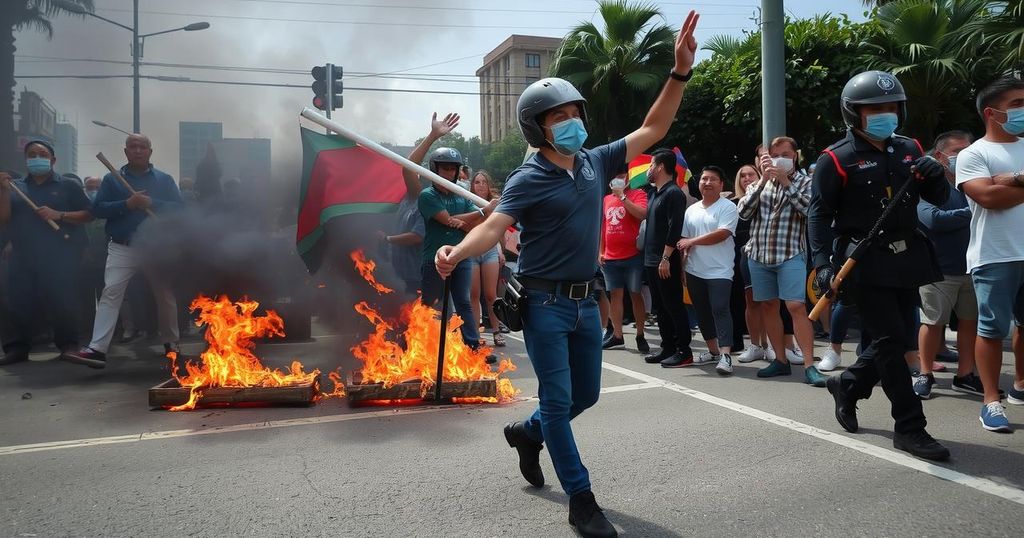Bolivia’s Protests Reflect a Broader Crisis in South America

Bolivia has entered a period of turmoil marked by widespread protests and clashes rooted in a political struggle between President Luis Arce and former President Evo Morales. The unrest is compounded by economic crises, fueling dissatisfaction with the government. This trend of instability is not unique to Bolivia, as other South American nations like Ecuador, Peru, and Colombia face similar challenges, indicating a region-wide crisis in governance and public trust.
In recent months, Bolivia has experienced widespread street protests and violent clashes, reflecting a larger pattern of discontent across South America. Demonstrations have escalated over the past two months, driven by economic crises, fuel shortages, and a deepening political struggle between President Luis Arce and former President Evo Morales. While Morales is currently grappling with serious legal allegations, the broader unrest mirrors similar anti-government movements in neighboring countries like Ecuador, Peru, and Colombia, indicative of a growing trend of instability throughout the region.
At the heart of Bolivia’s unrest lies the internal conflict within the Movement for Socialism (MAS), a party that has maintained a dominant presence in Bolivian politics for two decades. This struggle is characterized by a clash for party leadership ahead of the 2024 presidential elections. President Arce seeks to assert independence from Morales, who initially brought Arce into the political fold. The former president now faces criminal charges, further intensifying divisions and sparking clashes between their respective supporters.
Compounding these political tensions are severe economic challenges, including rising costs and limited access to essential goods. As public dissatisfaction grows, it is perceived that the ongoing political turmoil is obstructing any substantive solutions to economic issues. Citizens are increasingly frustrated with the ineffective justice system that they feel is weaponized against political rivals, contributing to broader unrest.
Bolivia is not isolated in its struggles; regional neighbors are also facing notable challenges. In Peru, President Dina Boluarte has witnessed protests fueled by widespread dissatisfaction with corruption and public safety issues. Her approval rating remains critically low, exacerbated by a historical backdrop of violence against protesters.
Colombia, under President Gustavo Petro, has witnessed significant protest activity against proposed reforms, reflecting public resistance to his administration’s managing of health care and economic changes. Similarly, Ecuador has been embroiled in conflicts with organized crime and civil unrest over governmental authority, contributing to an environment of political instability common to the region.
As Bolivia heads toward upcoming elections in 2024, the future of its political landscape remains uncertain. While Arce’s potential candidacy is unclear, Morales remains sidelined despite his enduring influence. The internal fissures within the MAS party could signal significant transformations ahead, possibly altering Bolivia’s political dynamics even further. However, the current lack of a viable opposition poses challenges for substantial governance reform.
The recent protests in Bolivia occur against a backdrop of broader political unrest across South America, characterized by rising discontent with government administrations. In Bolivia, the primary source of tension is the struggle for power between President Luis Arce and his mentor, Evo Morales. This conflict highlights the internal divisions within the MAS party, which has maintained political dominance for years. Regional issues such as economic decline, corruption, and ineffective law enforcement further exacerbate the social unrest, echoing similar situations in Peru, Colombia, and Ecuador.
The ongoing crisis in Bolivia, marked by intensified protests and political fragmentation, underscores a significant shift within Latin America. The unrest reflects not only the power struggle between influential political figures but also deep-seated economic grievances. With growing discontent spilling over borders, it remains essential for regional leaders to address these pressing issues or risk further destabilization. As Bolivia prepares for its presidential elections, a pivotal transformation in its political landscape appears imminent, one that could have lasting implications for South American governance.
Original Source: www.firstpost.com







